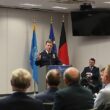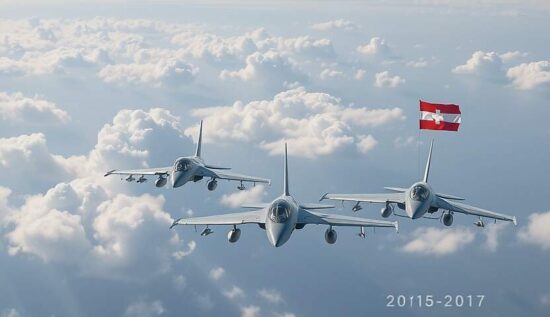A significant cooperation agreement was signed on January 17, 2025, by the top military officials from Germany, Switzerland, and Austria, aiming to further intensify their military cooperation.
General Ingo Gerhartz (Germany), Divisionary Peter Merz (Switzerland), and Generalmajor Gerfried Promberger (Austria) have set a crucial step in their partnership, focusing on common defense strategies and interoperability.
The agreement encompasses several strategic goals, including the development of ground-based air defense, the promotion of capability development, efficient use of shared resources and infrastructure, and the strengthening of interoperability between the air forces of the three countries.
Joint exercises and training programs will play a central role in fostering the exchange of best practices and procedures. Notably, the introduction of the annual Air Chiefs’ Meetings in the DACH format will serve as a platform for continuous development of this cooperation.
Despite the close military partnership, the three countries remain committed to their respective security policies. Switzerland, in particular, maintains its policy of neutrality, while remaining willing to strengthen its defense capabilities through regional cooperation. The agreement with Germany and Austria does not contradict the principles of Swiss neutrality, as it does not involve direct military commitments to participate in international conflicts.
Switzerland pursues its military cooperation within a framework that allows it to preserve its independence and neutrality. A notable example of this is the “European Sky Shield Initiative” (ESSI), in which Switzerland has been participating since 2023.
Initiated by Germany, this air defense initiative aims to strengthen European air defense and develop a common response to potential aerial threats. However, Switzerland emphasizes in an additional statement that its participation in ESSI does not involve commitments to provide assistance in armed conflicts. Consequently, the country’s neutrality remains unaltered.
Austrian Defense Minister Klaudia Tanner highlighted the significance of this new cooperation agreement as a crucial step in protecting the population. “Following the implementation of the state treaties on the defense against non-military aerial threats with Switzerland and Germany, this deepening of cooperation is another important step for the security of the population” she stated.
For Austria, which relies heavily on a strong national air defense, cooperation with neighboring states offers a vital opportunity to pool resources and expertise to address the growing complexity of security challenges.
While this development is viewed positively, there are also critical voices. In Austria, for instance, there are concerns that the intensified military cooperation with neighboring countries could compromise the country’s neutrality. However, the responsible officials repeatedly emphasize that these cooperation agreements primarily focus on improving the common security architecture and do not involve any commitment to participate in international conflicts or military interventions.
In summary, the cooperation between Germany, Switzerland, and Austria in the areas of air defense and military cooperation has reached a new dimension. The agreement ensures that all three countries can use their defense capabilities more efficiently, without jeopardizing the neutrality principles of Switzerland.





